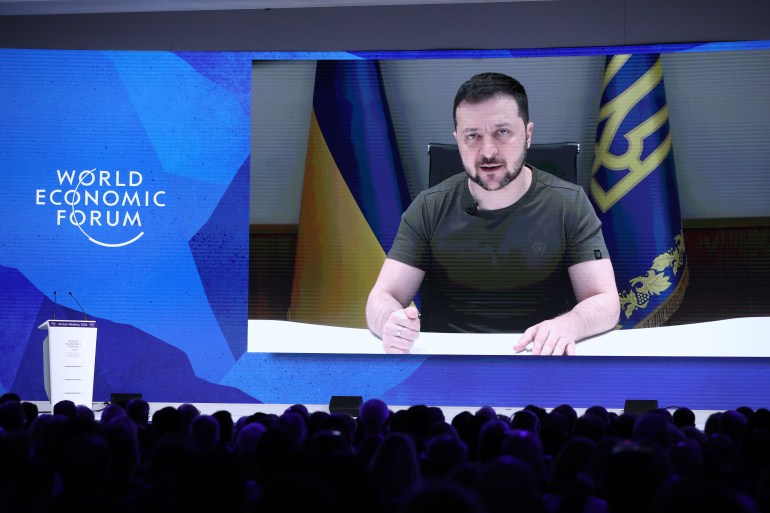The developments of the Russian war on Ukraine dominated the work of the World Economic Forum in Davos in Switzerland, and Ukrainian President Volodymyr Zelensky had the opportunity to address the forum, which brings together more than 2,000 world leaders, business leaders, politicians and experts.
European Commission President Ursula von der Leyen took advantage of the forum's opportunity to invite the international community to confront Russia, and said that "the war in Ukraine is a task that must be taken up by the international community."
She noted that Russia is using food supplies as a weapon with global repercussions, and is behaving in the same way it does in the energy sector.
The European official stressed that she would do everything in her power to support Kyiv, to win the war and to provide the necessary financial and military aid to "contain the Russian aggression," as she put it.
"Global cooperation is the antidote to Russia's blackmail," she said, explaining that "the Kremlin's army confiscates stocks of grain and machinery in Ukraine, and in the Black Sea, Russian warships are blockading Ukrainian ships loaded with wheat."
She added that frozen Russian assets should be used for the reconstruction of Ukraine, whose infrastructure was damaged by Russia's military intervention.
food crisis
The European Union has pledged to open "solidarity channels" with Ukraine using alternative logistical methods to help the country export grain, while EU agriculture ministers are meeting in Brussels today to discuss progress in launching these channels.
The Kremlin said on Monday the West was to blame for the global food crisis by imposing the toughest sanctions in modern history on Russia over the war in Ukraine.
NATO Secretary General Jens Stoltenberg said trade with authoritarian regimes such as Russia and China undermined Western security.
Speaking at the World Economic Forum, Stoltenberg added that the war in Ukraine showed how economic relations with authoritarian regimes can create weaknesses, referring to the European Union's imports of Russian fossil fuels and China's construction of 5G networks.
"We must recognize that our economic choices have implications for our security, and that freedom is more important than free trade," he said.
The Ukrainian president confirmed his readiness to meet his Russian counterpart (Anatolia)
Putin meeting
And Ukrainian President Volodymyr Zelensky said in a speech at the forum - via video - that "Russian President Vladimir Putin is the only Russian representative he wants to meet, and that the only topic of discussion that can be raised is ending the war in Ukraine."
Zelensky noted that conducting negotiations between his country and Russia has become more difficult because of the Russians' attitude towards civilians in the "Ukrainian territories they occupy."
In turn, Spanish Prime Minister Pedro Sanchez called for the Russian President to be isolated from the international community, against the backdrop of the war he launched against Ukraine and its global repercussions.
In his speech at the forum, Sanchez stressed the need for open strategic autonomy for the EU in order to forge new links with other regions, such as Latin America.
The Spanish Prime Minister indicated that Finland and Sweden, which have applied to join NATO, will participate in the NATO meeting scheduled for late June in Madrid.
NATO expansion
In a related context, Finnish Foreign Minister Pekka Haavisto said today, Tuesday, that Finland and Sweden will send two delegations to Turkey tomorrow, Wednesday, to try to reach a solution regarding Ankara's opposition to their joining NATO.
"We realize that Turkey has some security concerns related to terrorism, and we believe that it is possible to resolve these matters," Haavisto said during a panel discussion at the forum.
Turkish President Recep Tayyip Erdogan, who opposes Sweden and Finland joining NATO, made two phone calls to the two countries' leaders on Saturday and discussed his concerns.
Turkey says Sweden and Finland harbor people linked to the Kurdistan Workers' Party (PKK) and supporters of Turkish cleric Fethullah Gulen, whom Ankara accuses of plotting an attempted coup in 2016.

